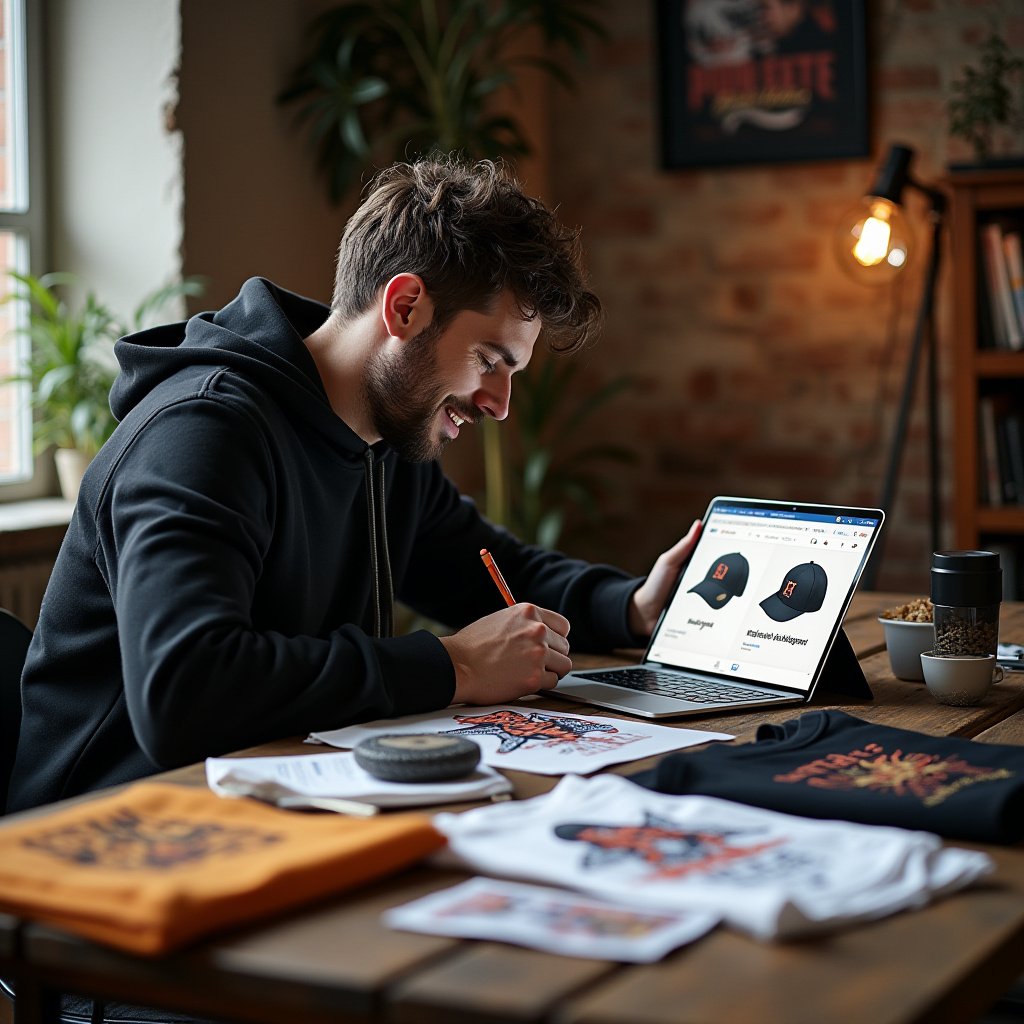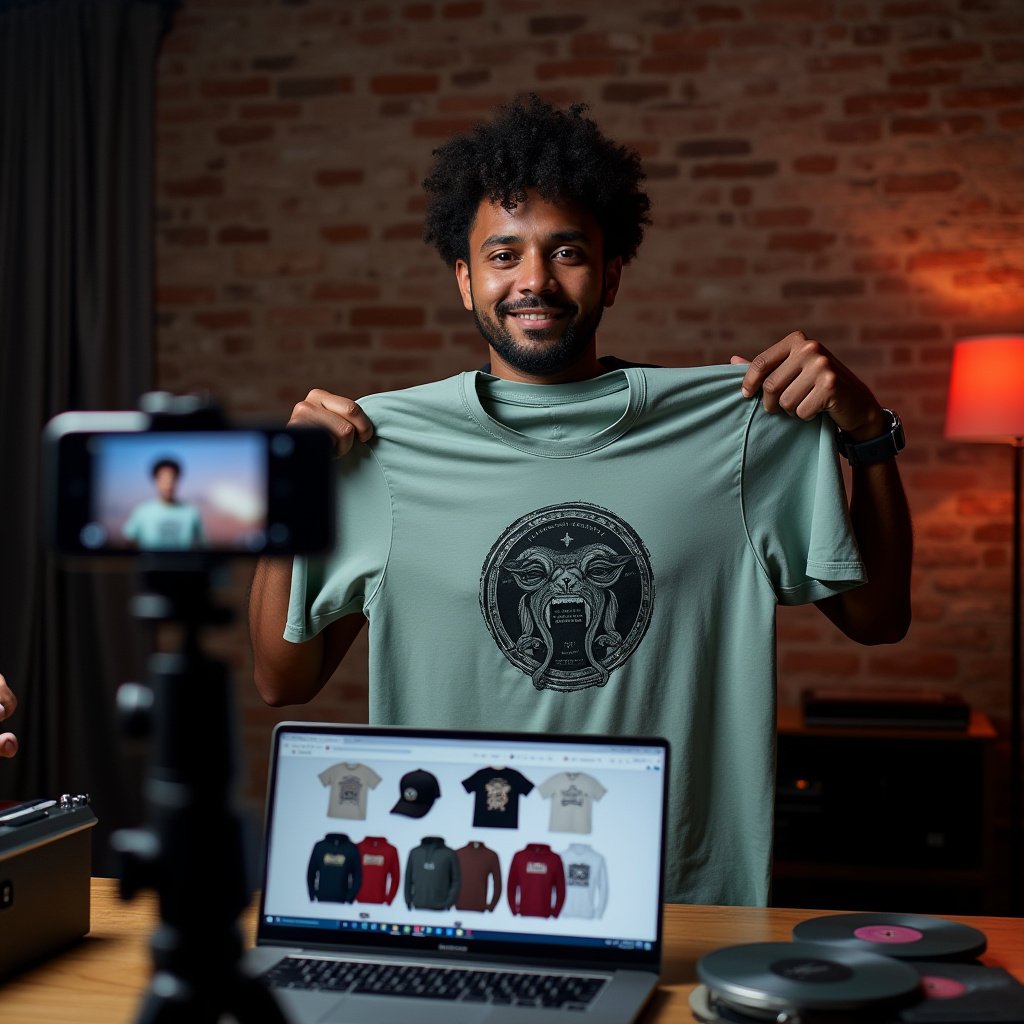Merchandise can be much more than an add-on to your music career—it can be a reliable revenue stream and a way to connect deeply with your fans. For independent musicians and emerging artists, selling merch is an accessible and satisfying way to earn money while promoting your brand. Whether you’re just starting out or looking to level up your merch game, this guide will walk you through everything you need to know to design, promote, and sell merchandise successfully.
From creating merch your audience will love to setting up an online store and selling products at live shows, here’s your ultimate roadmap.
Why Merch Matters for Musicians
Merchandise isn’t just about making extra cash (though that’s a major perk). It’s also a way to build your brand and strengthen your relationship with fans. Here’s why merch is essential for independent musicians:
- Sustainable Revenue: Streaming pays pennies, but a single T-shirt sale can bring in $25 or more. Merch gives you control over your income.
- Enhanced Fan Connection: When a fan wears your merch, they’re expressing loyalty and helping to promote your music to others.
- Brand Expansion: Custom merch allows you to establish an aesthetic and identity that reflects your artistry.
By combining creativity and strategy, merch can become one of your most effective tools for growth.
Step 1: Designing Merchandise Your Fans Will Love
The first step to selling merch is creating designs that resonate with your audience. Here’s how to get started:
Know Your Audience
Who are your fans, and what do they love? Use analytics from your social media or music platforms to get a clearer picture of your audience’s age, gender, interests, and style preferences. For instance:
- If your fans are into streetwear, think bold graphics and minimalist designs.
- If your base loves vintage aesthetics, consider retro logos or soft, muted colors.
Keep It On-Brand
Your merch should reflect your music and personality. If your music is moody and introspective, a dark, minimal design might suit you. If it’s upbeat and fun, experiment with bright colors and playful patterns. Examples of popular merch items include:
- T-shirts and hoodies with lyrics or album art.
- Tote bags with a unique logo or symbol.
- Vinyl records or personalized patches for collectors.
Invest in Quality
Fans will notice if you cut corners on production. Choose durable materials and professional printing methods that will stand the test of time. Remember, your merch represents your music, so offering quality builds trust and loyalty.
Test Your Designs
Before committing to a large production run, create mock-ups and share them with your fans on social media. Platforms like Instagram Stories or Twitter polls allow fans to vote on designs, making them feel involved while giving you valuable insights.

Step 2: Setting Up Your Online Store
With more fans shopping online than ever, setting up an e-commerce store is essential. Thankfully, it’s easier than you think:
Choose a Platform
Platforms like Shopify, Bandcamp, or Big Cartel cater specifically to artists and independent sellers. They provide templates and tools to quickly build a professional-looking store.
Professional Tips for Success:
- Clear Photos: High-quality product images attract buyers. Include multiple angles and close-ups of your designs.
- Detailed Descriptions: For every item, include the dimensions, materials, and any unique details like limited-edition status.
- Transparent Pricing: Ensure prices are visible and add estimated shipping costs to boost trust.
Bundle and Upsell
To encourage larger purchases, offer bundles like “Buy a hoodie and get a sticker for free” or discounted shipping when fans purchase multiple items.
Step 3: Promoting Your Merchandise
Your merch won’t sell itself—promotion is key. Fortunately, independent musicians have a built-in advantage with social media and direct fan outreach.
Use Social Media Strategically
Show your merch in action! Post photos or videos of you and your fans wearing your products. Share behind-the-scenes content of the merchandise design or production process. Use these social platforms:
- Instagram and TikTok for showcasing products with creative visuals and trending music.
- Twitter for flash sales or releasing limited-edition items.
- Facebook for engaging directly with older fan demographics.
Leverage Email Marketing
Email newsletters are an incredibly effective way to drive traffic to your store. Notify fans when new products drop or remind them about an ongoing sale with exclusive discount codes. Use phrases like, “Be the first to grab our limited-edition merch—only 50 pieces available!”
Collaborate with Influencers
Find small influencers (think niche fashion bloggers or other indie musicians) who align with your style and music. Offer them free merch in exchange for promotion.
Run Promotions
Launch campaigns around milestones, such as an album drop or tour announcement:
- “Celebrate the album release! Get 10% off all orders this weekend.”
- “Limited run of 100 hoodies—grab them before they sell out!”

Step 4: Selling Merch at Live Shows
Live performances remain one of the best places to sell merch. Fans are often excited and ready to buy something that reminds them of the experience.
Create a Visually Appealing Merch Table
Make your display pop with good lighting, stylish signage, and neat organization. Use props like mannequins or racks to showcase clothing. Include pricing labels and an organized setup so fans can order quickly between sets.
Offer Exclusive Live-Only Items
Tease unique merch at your gigs, like signed posters or live-only albums. This adds exclusivity and encourages impulse purchases.
Make It Easy to Pay
Invest in a card reader for cashless payments and offer QR codes that link to your online store. Gen-Z fans may rarely carry cash, and you don’t want to miss out on sales.
Building Long-Term Success with Your Merch
Selling merchandise isn’t just about making quick money—it’s about fostering long-term loyalty from your fans. Over time, keep refreshing your offerings with unique designs or seasonal exclusive collections.
Pro Tip: Always listen to feedback. Monitor which items sell out fastest and what your fans request—these are the clues to what truly resonates.

Take Control of Your Music Career
Merchandise is one of the most effective pathways to financial independence as an independent musician. By designing on-brand, high-quality pieces, leveraging online platforms, and using live events strategically, you can generate significant revenue while building your connection with fans.
Need help starting your merch empire? Check out [Artist Plus] for the resources, tools, and community guidance tailored for independent musicians like you.
Take charge, get creative, and watch your merch game elevate your music career!

